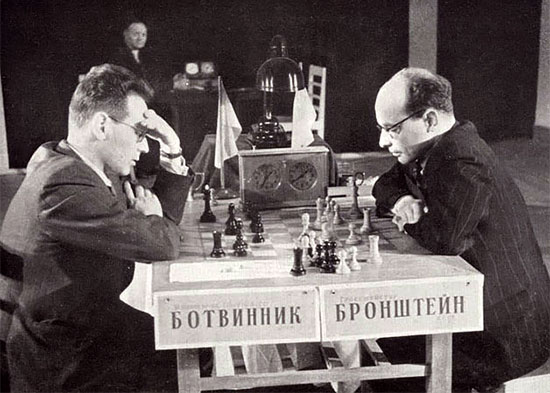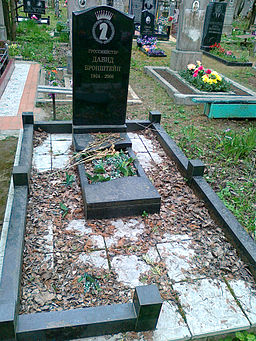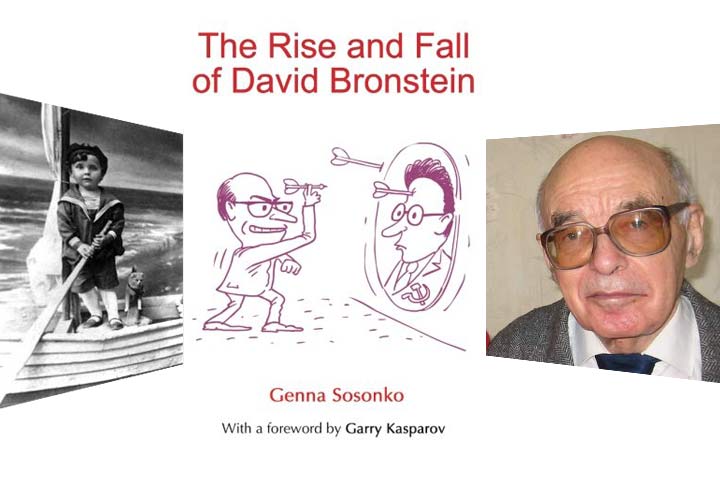Genna Sosonko's
The Rise and Fall of David Bronstein
Review
Half a point — a single draw — and David Bronstein would have been World Champion. In 1951 he played against reigning World Champion Mikhail Botvinnik for the title and after 22 of 24 games Bronstein led 11½-10½. To seize the title Bronstein needed only one point from the last two games — in case of 12-12 tie Botvinnik would remain champion. But in the crucial 23rd game Bronstein, who was playing with black, lost his nerve and lost a drawn endgame.
In the 24th and last game Bronstein had White but after 22 moves he found himself in a position with a pawn down and no compensation and agreed to a draw. The match ended in a 12-12 tie and Botvinnik defended his title.
Later Bronstein came up with endless explanations why he did not win the match. In his book The Rise and Fall of David Bronstein, which deals with the life and career of Bronstein, Genna Sosonko lists some of these explanations:
Disregarding the fundamental truth that several different excuses always sound less convincing than one, Bronstein found a number of scapegoats and reasons for his loss: his hatred-filled opponent, the atmosphere of that time, fear for his father, his seconds who neglected their duties, walks with a girlfriend who didn't care about his career, and the hardships he endured. ...

"That monstrous blunder that I made in game six, just one move. It was all very simple. Before the second session, during my morning walk, I happened to bump into my wife, Olga, whom I had divorced for all practical purposes. One thing led to another, we started to quarrel, and continued for nearly an hour. Yet, at the same time, my seconds were demanding that I play to win. So I went to the resumption of that ill-fated game feeling mentally drained."...
On another occasion [Bronstein explained]: "People would ask why I took part in FIDE's qualifying tournaments in the first place if I wasn't striving to become world champion? The answer is very simple. In those days, there were few international tournaments; you had to play in qualifying tournaments and prove that you belonged to the world's chess elite to get your own national federation to respect you, so that it would then send you to those tournaments."
Then he began to resort to a more radical explanation: "I had good reasons not to become world champion. In those days, that title meant that you had to become part of the official world of chess bureaucracy and take on all sorts of responsibilities, which was incompatible with my personality."
(Genna Sosonko, The Rise and Fall of David Bronstein, Elk and Ruby 2017, p. 72-73. The Russion original of the book was published in 2014.)
The missed chance to become World Champion became an obsession for Bronstein who is described by Sosonko as an egotistical person who in endless monologues knew only one topic: himself. To quote Sosonko: "I can't ever recall him asking how things were or what plans I had. It was always about him, himself, and his chess. His place in chess was the meaning and substance of his entire life." (p.99)
But in regard to "his place in chess" Bronstein had hardly any need to worry because his chess career and his contributions to chess are very impressive. Bronstein was born on February 19, 1924 in the small village of Bila Tserkva in Ukraine, at that time part of the Soviet Union. In 1937 Bronstein's father, a "rebel" according to Sosonko, was sentenced to seven years in a labour camp after publicly criticising the government.

Due to his weak eyesight Bronstein was declared unfit for military service and did not have to fight in World War II but he had to flee from the German army, was homeless, and again and again suffered from cold and hunger. Yet after the war he quickly became of the world's best players. In 1948 he won the Interzonal Tournament in Saltjösbaden, and in 1948 and 1949 he twice finished shared first in the Soviet Championship. In the Candidates Tournament 1950 he shared first place with his friend and training partner, Isaak Boleslavsky, whose daughter, Tatiana, Bronstein later married. In the tie-break after the Candidates Bronstein defeated Boleslavsky, probably after an agreement between the two. This gave Bronstein the right to play against Botvinnik for the World Championship.
(Above) Vassily Smyslov David-Bronstein Paul Keres and Mikhail Botvinnik at the 11th Chess Olympiad in Amsterdam, 1954
A great role in Bronstein's career played his mentor and supporter Boris Vainshtein — a cultivated, intelligent, elegant and charming man who, however, was a highly ranked officer at the Soviet secret service, the NKVD, predecessor of the KGB, and in this role he actively supported a system of terror and suppression.

Vainshtein was a passionate and strong chessplayer who saw the enormous talent of the young Bronstein and adopted him as his protégé. Vainshtein provided Bronstein with food, allowed him to live in his place and used his considerable political influence to support Bronstein's career and to let him play abroad. Vainshtein also had the idea to write a book about the Candidates Tournament 1953 in Zurich, in which Bronstein finished second behind Smyslov. A lot of players consider this book, of which Bronstein is the credited author, as one of the best chess books ever written. However, Bronstein only contributed analyses, Vainshtein wrote "the entire narrative part". (See The Rise and Fall, p. 139)
The Candidates Tournament in Zurich 1953 was the last time that Bronstein had good chances to play another match for the World Championship. After Zurich he achieved a number of successes in more or less important tournaments and occasionally played brilliant games but he was no longer part of the very top. Bronstein died on December 5, 2006, in Minsk, at the age of 82.
Bronstein's contribution to the development of chess is enormous. To quote Sosonko, who quotes Korchnoi:
I once asked Korchnoi, who traditionally wasn't one to hand out compliments, whether Bronstein was an outstanding player. He answered with a tirade: 'Was Bronstein an outstanding player? He was a genius, what a genius! A genius is somebody ahead of his time, and Bronstein was far ahead of his time. If Botvinnik said that Bronstein was very strong when the opening was making a transition into the middlegame then that was a very weak statement. In reality, at that point in the game, Bronstein demonstrated many ideas that were complete revelations. That's the sign of a genius. He understood the game better than anyone from 1945 through 1951. Had there been no Bronstein, there would have been no Tal.' (p.84)
Bronstein also had many ideas that enriched chess: he had the idea to arrange the pieces randomly on the first rank — which today is known as Fischer-Random or Chess960 — he proposed to play games with increment, and he advocated to let two players play against each other on more than one board, to name just a few of his ideas. But according to Sosonko Bronstein had a grim view about his chess career and his achievements:
In the old days, he would find enemies in the sports committee, then in the Soviet Chess Federation, then in the government. After the Soviet Union collapsed, he complained that he had been deprived, cheated out of his fair share, forgotten, and betrayed. Bronstein listed his complaints in his last books, articles, and interviews. Everything that he wrote and said at the time could have been published under the same title: Grievances. (p.172)
Sosonko's memories of Bronstein are well and passionately written but Sosonko does not draw a friendly picture of the grandmaster. Instead, he draws a picture of an egomanic, who failed to become world champion and therefore liked to cast himself in the role of chess improviser and as a player for whom beauty was more important than competitive success.

Still, the question arises why it is necessary to extensively describe and detail the character failings of someone who is first of all remembered as a chessplayer and chess thinker. Sosonko might have shared these doubts because at the very end of his book he writes:
[A] powerful thought pierced my mind: 'Why did I write all that stuff about this great chess player who suffered so much at the end of his life? Why? What was the point of all that philosophizing and those attempted explanations Who was all that for?' You see, I knew deep down that I shouldn't have tried to recall anything. I should have left the departed alone in their graves and should have allowed the living to keep their illusions. (p.269)
Photo (above): Gruszecki (Own work) via Wikimedia Commons [CC BY-SA 3.0]
However, when you read these sentences the illusions you might have had about Bronstein are already shattered. But shattering illusions can be healthy and helpful, and Sosonko's book does not only give insight into the life and times of a legendary chessplayer but also gives answers to hotly debated questions of chess history: Thus it seems as if the match between Botvinnik and Bronstein in 1951 was not manipulated - despite all conspiracy theories and in contrast to the match between Boleslavsky and Bronstein one year before that made Bronstein challenger of Botvinnik. Moreover, it is hard to see Bronstein who was protected by the powerful and influential Boris Vainshtein as a victim of the political situation in the Soviet Union. However, the time and the circumstances in which Bronstein lived certainly contributed to make Bronstein a bitter man who could not see and cherish his many achievement and successes.

David Bronstein in 1968 | Photo: Erich Koch, Wikipedia)
But maybe it's best to remember the person and the chess artist David Bronstein with his games. Here are three of his many brilliancies:
This DVD concentrates on the King's Gambit accepted with 3.Bc4. Williams has included a lot of novelties and interesting attacking variations that should wet the lips of any attacking player, looking for an interesting way of meeting 1...e5!

Paul Keres | Photo: Erich Koch, Wikipedia)
The Alekhine is an often underrated defense that leads to strategically and tactically interesting positions in which the better player has good chances to win. Andrew Martin shows the basic ideas of this fascinating opening.
Links





























